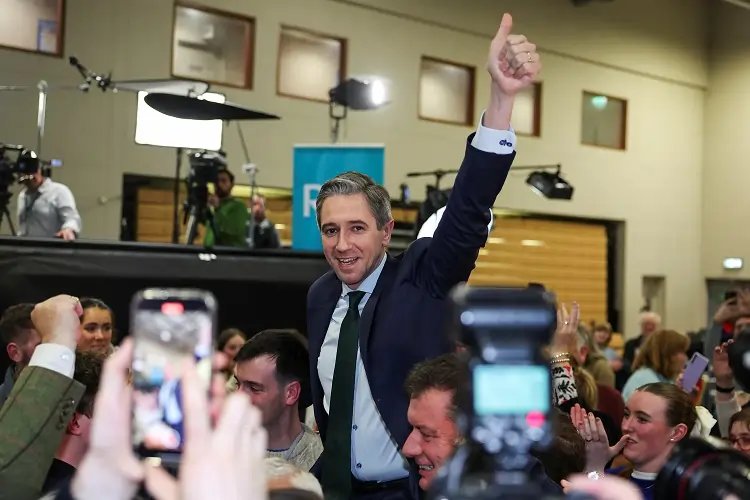Irish centre-right parties seek coalition deal as Trump threat looms


By Padraic Halpin and Conor Humphries
DUBLIN (Reuters) – Ireland’s two large centre-right parties are set to begin their search for a coalition partner this week after Friday’s election looked likely to leave them just short of the 88 seats needed to govern, a choice that will help determine their policy platform.
Prime Minister Simon Harris’ Fine Gael and coalition partner Fianna Fail bucked a global trend of voters rejecting incumbents when they won 20.8% and 21.9% of the vote respectively, a broadly similar level to the last election in 2020.
With outgoing junior coalition partner the Greens set to lose all but one of its seats, the choice is between one of Ireland’s smaller left-leaning parties or a number of more conservative independent lawmakers.
The final seats are likely to be filled on Monday.
“There is certainly the possibility for this additional partner to have an outsized impact on the ideological direction,” said Theresa Reidy, senior lecturer in politics at University College Cork.
Fine Gael and Fianna Fail have ruled out a deal with the other main party Sinn Fein, the leftist opposition whose vote fell to 19.0% from 24.5% in 2020 and 35% in opinion polls a year ago when it appeared on course to lead the next government.
Harris called the election on the heels of a 10.5 billion euro ($11 billion) giveaway budget, but will be under pressure to heed widespread frustration at the outgoing government’s inability to turn the healthiest public finances in Europe into better public services.
Senior Fine Gael and Fianna Fail ministers have said talks on forming a new government would take weeks at least. Party figures have said they would like a deal before the inauguration of U.S. President-elect Donald Trump on Jan. 20, but that it is not a hard deadline.
Trump’s pledges to slash corporate tax and impose tariffs pose a potentially major threat to Ireland’s economy, which is heavily dependent on the taxes and jobs of a cluster of U.S. tech and pharmaceutical multinationals.
“Ideally if we can form a government prior to that (Trump’s inauguration), that’s positive, but I think we need to form a government that can last,” Finance Minister Jack Chambers of Fianna Fail told Reuters, adding that negotiations should not take the 4-1/2 months needed in 2020.
Fine Gael and Fianna Fail have formed stable governments in the past backed by independents and both have governed with one of the two possible centre-left partners, Labour. The other, the relatively new Social Democrats, has never been in power.
While 88 votes are required to pass legislation and approve ministers, parties will really need around 94 to have a comfortable majority capable of going the full five-year term, former prime minister Bertie Ahern told state broadcaster RTE.
“The reality is they have plenty of choices,” giving them plenty of bargaining power, Ahern said.
($1 = 0.9456 euros)
(Reporting by Padraic Halpin and Conor Humphries; Additional reporting by Graham Fahy; Editing by David Holmes)
Economic growth refers to an increase in the production of goods and services in an economy over a period of time, typically measured by GDP.
Investment portfolios are collections of financial assets such as stocks, bonds, and cash equivalents held by an individual or institution to achieve specific financial goals.
Explore more articles in the Top Stories category











